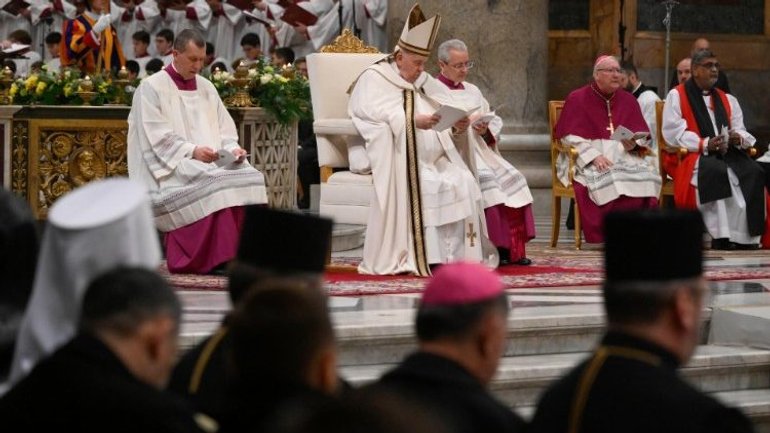Pope tells all Christians to oppose war and injustice wherever they appear

The Lord is grieved by our indifference and lack of understanding before sacrilegious violence Pope Francis said during his homily at Vespers on the Feast of the Conversion of St. Paul, and he called for action to oppose war, violence and injustice wherever they begin to appear.
Celebrating the liturgy to mark the end of the annual Week of Prayer for Christian Unity in the Basilica of Saint Paul’s Outside the Walls, the Pope invited Christians of all denominations to change and walk the path of unity “the Lord has placed before us.”
The Holy Father reflected on the readings of the day that call for change, and noted that “we celebrate the joy of coming together as brothers and sisters in Christ” in days that are so “full of tragic and troubling news reports.”
“We could perhaps easily dispense with such biblical condemnations of the sins of society! Yet if we are sensitive to the profound unease of the times in which we are living, we should be all the more concerned for what causes suffering to the Lord for whom we live,” he said.
“Since we have gathered in his name, we cannot fail to put his word at the centre of things.”
Do good, seek justice
The Pope recalled the theme of this year's Week of Prayer – “Do good; seek justice” – explaining that God admonishes us to renounce evil and urges us to change.
“Admonishment and change are the two words on which I would like to reflect with you this evening,” he said.
Taking his cue from the prophet Isaiah, the Holy Father said the Lord does not desire “incense and offerings, but that the poor receive assistance, that justice be rendered to the orphan, that the cause of the widow be upheld.”
He said that God suffers “when we, who call ourselves his faithful ones, put our own ways of seeing things before His, when we follow the judgments of the world rather than those of heaven, when we are content with exterior rituals yet remain indifferent to those for whom He cares the most.”
“God is grieved by our indifference and lack of understanding.”
In addition to this, he added “there is a second and more serious motive that offends the Most High: It is sacrilegious violence.”
“We can imagine with what suffering he must witness wars and acts of violence perpetrated by those who call themselves Christians.”
This admonition of the Lord, he continued, gives us much food for thought, as individual Christians and as Christian confessions.
We have no excuses
“I would like to state once again that today, with our developed spirituality and theology, we have no excuses,” the Pope said.
Still, there are those who appear to feel encouraged or at least permitted by their faith to support varieties of narrow and violent nationalism, xenophobia and contempt, and even the mistreatment of those who are different.
Faith, he added, must maintain “a critical sense in the face of these tendencies, and prompt an immediate response whenever they rear their head.”
With God all is possible
The Pope went on to say that after diagnosing our wrongs, the Lord asks us to remedy them.
“Due to our failure to understand God and the violence that lurks within us, we are incapable of setting ourselves free,” he said, reminding those present that, “without God, without his grace, we are not healed of our sin.”
“God’s grace is the source of our change (…). By ourselves, we cannot succeed, but with God, all is possible. By ourselves, we do not succeed, but together, it is possible.”
He reflected on how conversion is communitarian and ecclesial in nature, and invited all Christians to be open, together, to a change of perspective.
To rediscover that “all the faithful throughout the world are in communion with each other in the Holy Spirit, so that - as Saint John Chrysostom wrote – ‘those who dwell in Rome knows those in India to be part of the same body”.
Finally, Pope Francis expressed gratitude for this journey of fellowship and for the participation and interest of so many Christians for the synodal journey of the Catholic Church, “which I trust will become increasingly ecumenical.”
And inviting those present to continue to grow through praying, serving, engaging in dialogue and working together towards the full unity that Christ desires, he offered his thanks to all the Christian communities present for the celebration.
“All together may we journey along on the path that the Lord has placed before us, the path of unity.”









